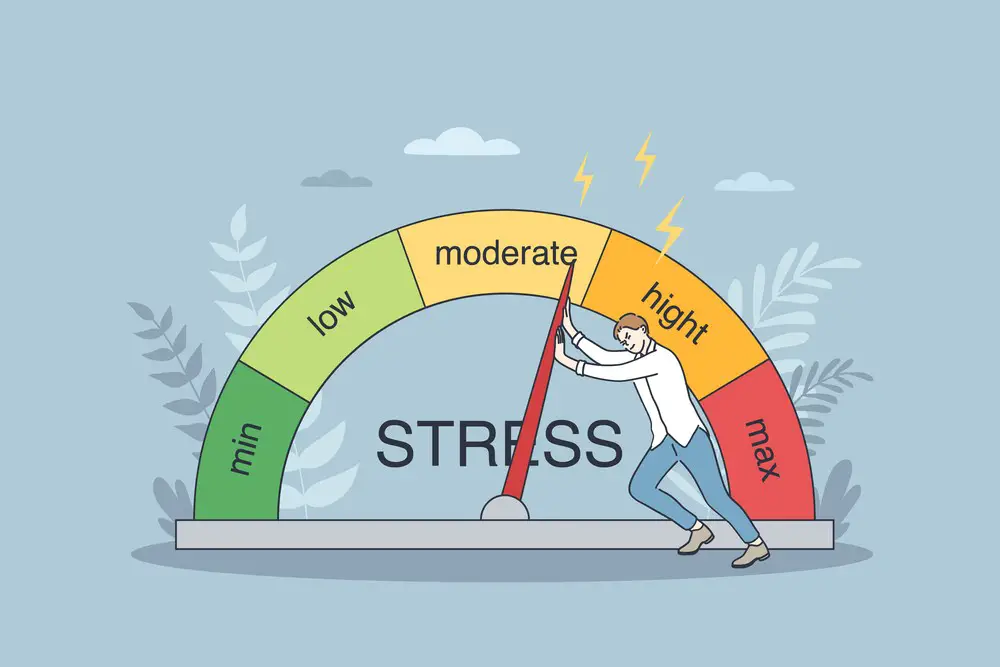As a BetterHelp affiliate, we receive compensation from BetterHelp if you purchase products or services through the links provided
As a dog owner, you might think your beloved pet is just a ball of fur and joy. But sometimes, the reality is quite different. As much as you love your dog, their presence could negatively impact your mental health. Whether it’s due to improper training, lifestyle changes, or other factors, the stress and anxiety caused by your four-legged friend can weigh heavily on you.
Recognizing the issue is the first step in finding a solution. Many dog owners might dismiss the notion that their dog is causing them mental distress, but understanding your dog’s role in your mental health is crucial. By evaluating the various factors contributing to your anxiety, you can devise a plan of action to restore your sanity and your relationship with your dog.
Sometimes, the dog’s breed or temperament might be causing stress. Perhaps their energy levels are too high for your lifestyle, or they have specific triggers that lead to problematic behaviors. In any case, it’s important not to blame your dog for your struggles. Instead, focus on finding effective training strategies, medical interventions, or other resources to help alleviate the tension in your home.
Key Takeaways
- Acknowledging that your dog may be contributing to your mental health issues is vital to finding solutions.
- Different breeds and temperaments can contribute to stress and anxiety, but blaming your dog is not helpful.
- Consider effective training strategies, medical interventions, or other resources to improve your mental well-being and your dog’s behavior.
 Understanding the Issue
Understanding the Issue
Causes of Stress
Stress can come from various sources in your life, such as work, relationships, and finances. When it comes to your dog, there are several reasons they might contribute to your stress levels:
- Constant barking or destructive behavior
- Demanding attention or not giving you personal space
- The financial cost of caring for the dog
- Scheduling conflicts due to walks and vet appointments
It’s essential to recognize these stress factors to address them effectively.
Symptoms of Anxiety
When you are stressed, you might experience symptoms of anxiety. Some common signs include:
- Constant worry or overthinking
- Irritability and mood swings
- Trouble sleeping or insomnia
- Feeling restless or on edge
- Difficulty concentrating or focusing
Awareness of these symptoms can help you take proactive measures to manage your anxiety.
Dog Influences on Human Mental Health
While dogs can bring joy and companionship, they can also impact your mental health. Some ways your dog might affect you include:
- The monotony of daily dog care can lead to burnout
- Taking on the responsibility of another living being can be overwhelming
- The messiness and clutter caused by a dog may contribute to feelings of depression
It’s crucial to balance the benefits and challenges of owning a dog to maintain mental health.
Key takeaway: Understanding the causes of stress and the impacts of dogs on your mental health can help you address the issue and find ways to alleviate the pressures you may be experiencing.
 The Role of Different Breeds
The Role of Different Breeds
Behavioral Differences
When it comes to dog breeds, they can have vastly different temperaments and behaviors. Some breeds may be more energetic and need lots of exercise, while others may be more prone to being couch potatoes. For example:
- Border Collies are highly intelligent and require constant mental stimulation.
- Bulldogs often prefer a more relaxed lifestyle and are generally low-energy.
- Golden Retrievers are friendly and great with families but may need more socialization opportunities to prevent boredom.
Understanding your dog’s breed-specific tendencies is crucial to managing your mental well-being. By catering to their unique needs, you can create an environment both you and your furry friend can thrive. Every dog is an individual, and their behavior may not always align perfectly with typical breed characteristics.
Aging and Its Effects
Getting older is a natural part of life; your dog is no exception. As your dog ages, their energy levels will likely decrease, and their behavior may change. Let’s take a look at some age-related considerations:
- Young dogs are often more active and require frequent physical and mental stimulation to channel their energy productively.
- Middle-aged dogs may begin slowing down but still need consistent exercise and engagement to maintain good health and happiness.
- Senior dogs might experience mobility, vision, and hearing declines but can significantly benefit from gentle physical activity and mental stimulation.
Adapting to your dog’s changing needs as they age is essential for their well-being and yours. You can reduce stress and maintain a strong bond by providing appropriate care and activities for your dog.
Remember, it’s crucial to find a breed that matches your lifestyle and be aware of each age group’s unique challenges. Consider your dog’s breed characteristics and age-related needs to create a harmonious environment and protect your mental health.

Potential Triggers
Separation Anxiety
You might notice that your dog becomes stressed and anxious when you’re not around, which could result from separation anxiety. Dogs with separation anxiety might:
- Whine, cry, or bark when you leave the house
- Become destructive, chewing on furniture or your belongings
- Have accidents in the house
To help manage your dog’s separation anxiety, consider:
- Practicing leaving and returning to establish a routine
- Creating a calm, safe space for them to spend time while you’re gone
- Offering interactive toys to keep them occupied
Key takeaway: Managing your dog’s separation anxiety could also help improve your mental health.
Aggression
Dealing with aggression in your dog can be an emotional and mental drain. Aggressive behaviors to watch out for include:
- Growling or barking at other dogs or people
- Snapping or attempting to bite
- Guarding resources, such as toys or food
Some strategies to address your dog’s aggression include:
- Consulting with a professional trainer or behaviorist
- Obedience and socialization training
- Positive reinforcement for good behavior
Key takeaway: Proper training and professional guidance could help your dog overcome aggression, thus benefiting your mental health.

Excessive Barking
Excessive barking can be frustrating and may impact your mental well-being. Here are some reasons your dog might be barking excessively:
- Boredom or lack of stimulation
- Seeking attention
- Fear or anxiety
To address excessive barking, consider:
- Providing enough exercise and mental stimulation for your dog
- Reinforcing quiet behavior with treats and praise
- Identifying triggers and working on counter-conditioning techniques
Key takeaway: Understanding and addressing the causes of excessive barking can help create a more peaceful environment that benefits you and your dog.
The Healing Power of Dogs
Comfort and Companionship
Dogs have long been known for providing comfort and companionship to their humans. Cuddling up with your furry friend after a long day can help alleviate stress and anxiety. Their warm presence and unconditional love can bring a sense of calmness and security to your life.
Having a constant companion can also make you feel less lonely or isolated. Together, you and your dog can create a strong bond, making the journey of mental well-being a shared experience.
Key takeaway: Dogs provide comfort and companionship and can alleviate stress.
Exercise and Mental Stimulation
Regular exercise is essential for maintaining good mental health, and owning a dog is a great way to ensure you stay active. Walking your furry buddy allows you to exercise, boost your mood, and explore the outdoors. As a result, endorphins are released, which can help keep your mind relaxed and stress-free.
Mental stimulation is just as important as physical exercise. Engaging your dog in play, teaching them new tricks, or using interactive toys can challenge their minds and keep you and your pet mentally sharp. Participating in these activities can be fun to bond with your pet and take your mind off your own challenges or worries.
Pro tip: Introducing regular exercise and mental stimulation activities into your daily routine enhances your bond with your dog and improves your mental health.
Effective Training Strategies
Puppy Training
When training your puppy, consistency is key. Use positive reinforcement to encourage good behavior, like praise or treats. Here are some tips to get started:
- Start with basic commands, such as “sit,” “stay,” and “come.”
- Use a steady, firm tone of voice.
- Keep training sessions short and enjoyable.
- Schedule training sessions during quiet times, away from distractions.
Implementing these strategies will create a strong foundation for your puppy’s lifelong learning and bonding experience.
Addressing Behavioral Issues
Behavioral issues can be frustrating for both you and your dog. Here are some suggestions to address common problems:
- Barking: Reward your dog when they remain quiet and redirect their energy to positive activity, like playing or training.
- Jumping: Teach them the “off” command and ask them to sit as an alternative behavior.
- Chewing: Provide appropriate chew toys, and don’t punish your dog if they chew something they shouldn’t—redirect their attention.
If your dog’s behavior continues to impact your mental health, consider consulting with a professional dog trainer or behaviorist. They can provide personalized guidance to help you address the issues affecting your well-being.
 Medical Interventions
Medical Interventions
Consulting a Veterinarian
When you notice that your dog’s behavior is taking a toll on your mental health, it’s essential to consult a veterinarian. They can help you identify potential health issues contributing to the problem. Discussing your concerns with them could give you valuable insights and solutions to improve your and your dog’s well-being.
- Share your concerns and observations openly.
- Ask the vet about possible causes and solutions.
- Remember, your veterinarian is a valuable resource, and they want to help you and your dog.
Medication and Treatment Options
Depending on your veterinarian’s recommendations, various medication and treatment options may be available for your dog. They will help improve your dog’s behavior, promoting a healthier home environment for you both.
Here are some possible treatment options you might encounter:
- Behavioral medications: These can help manage your dog’s anxiety, aggression, or other unwanted behaviors
- Pharmaceutical interventions: For specific health issues contributing to the problem, your vet might prescribe medication to alleviate symptoms and improve your dog’s well-being
- Therapeutic strategies: Your vet might suggest techniques to help modify your dog’s behavior, such as positive reinforcement or training sessions with a professional dog trainer
By exploring the medical interventions suggested by your veterinarian, you’re more likely to find a solution that improves your dog’s behavior and positively impacts your mental health. Maintaining open communication with your vet and implementing the recommended treatment plan is essential to ensure the best results. And remember, you’re not alone – support is available to help you and your dog live happier, healthier lives together.
When Rehoming is the Last Resort
Sometimes, despite your best efforts, it may become apparent that rehoming your dog is the best option for you and your furry friend. This can be a tough decision, but it’s essential to recognize when your mental health and well-being and your pet’s needs aren’t being met.
Assess the situation: Before making any decisions, take a step back and evaluate the circumstances. What aspects of pet ownership are affecting your mental health? Is there a possibility to change or improve these issues? It might help to consult with a professional, such as a veterinarian or a dog trainer, to explore possible solutions.
Consider alternative options: Before rehoming, consider other possible solutions. This could include getting professional training for your dog, seeking therapy for yourself, or exploring temporary arrangements like doggy daycare or pet sitters.
Choose the right new home: If rehoming becomes necessary, finding the best possible home for your dog is essential. Contact family, friends, or experienced foster homes to ensure a smooth transition. Don’t rush the process; allow yourself time to find the right person or family to care for your dog.
Make a plan: When you’ve found a suitable new home, create a detailed plan for the transition. This should include any necessary paperwork, such as transferring ownership and updating microchip information. It’s also important to share details about your dog’s temperament, habits, and medical history with the new owner.
It’s important to remember that rehoming your dog doesn’t mean you’ve failed as a pet owner. It means you’re putting your mental health and your dog’s best interests first. By finding the right new home, you can provide your dog with an environment where both of you can thrive.
Key takeaway: If maintaining pet ownership becomes detrimental to your mental health, consider rehoming as a last resort with a thoughtful and responsible approach.
Conclusion
Caring for a dog can sometimes become challenging and affect your mental health. Recognizing when your dog is causing mental health problems and taking appropriate action is essential.
One way to address this issue is by seeking professional help, such as visiting a veterinarian to discuss your dog’s behavior and possible solutions. They may recommend training classes or behavior modification techniques that can make life with your dog more enjoyable.
Remember to take time for yourself as well. Self-care is crucial for maintaining your mental health. Engage in activities that bring you joy and help you relax. Seeking support from friends, family, or even support groups can alleviate the burden you may be feeling.
Lastly, consider rehoming your dog if your mental health issues persist and the situation becomes unbearable. It’s essential to prioritize your well-being, and sometimes, the best solution might be finding a more suitable environment for your dog.
In summary, maintaining a healthy relationship with your dog requires addressing behavioral issues, self-care, seeking support, and considering rehoming when necessary. Your mental health is essential, and it’s vital to recognize when it’s being negatively affected by your dog. Remember these tips to ensure a happy, healthy life for you and your furry friend.
Frequently Asked Questions
How can I manage my mental health with a challenging dog?
Managing your mental health with a challenging dog can be tough, but finding ways to cope is important. Here are some tips to help:
- Set realistic expectations for your dog’s behavior and training progress.
- Practice patience and remain calm when dealing with your dog.
- Focus on the positive aspects of your dog’s behavior.
- Establish and maintain a consistent routine for both you and your dog.
- Seek advice from a professional dog trainer or behaviorist.
Key takeaway: With patience, consistency, and professional guidance, you can improve your mental health while dealing with a challenging dog.
What are some coping strategies for puppy blues?
Puppy blues are standard, but there are ways to manage them:
- Make time for self-care and engage in activities you enjoy.
- Surround yourself with a support system of like-minded dog owners.
- Celebrate small victories and progress in your puppy’s training.
- Remind yourself that the puppy stage is temporary.
Key takeaway: Combining self-care and a robust support system will help you overcome puppy blues.
How do I reduce anxiety and stress caused by my dog?
To reduce anxiety and stress, try these strategies:
- Implement a routine for you and your dog to provide structure and predictability.
- Practice mindfulness techniques like deep breathing or meditation.
- Focus on what you can control and let go of things outside your control.
- Take breaks from your dog by asking a friend or family member to help.
Key takeaway: Mindfulness, routine, and support from others can help reduce anxiety and stress caused by your dog.
How can I maintain a balanced life with a difficult dog?
Finding balance with a problematic dog may require some adjustments:
- Schedule regular exercise and training sessions for your dog.
- Create boundaries and designate spaces for your dog to minimize disruption.
- Set aside time for yourself to relax and unwind without your dog.
- Seek professional help for managing your dog’s behavior.
Key takeaway: Establishing a structured routine and taking time for self-care will help maintain a balanced life.
Can professional help improve my situation with my dog?
Absolutely! A professional dog trainer or behaviorist can help with:
- Assessing your dog’s behavior and identifying issues.
- Developing a tailored training program for your dog.
- Providing guidance and support throughout the training process.
- Teaching you techniques to manage your dog more effectively.
Key takeaway: Professional help can significantly improve your situation with your dog and overall well-being.
Are there support groups for people dealing with pet-related stress?
Yes, support groups and online forums are dedicated to helping people cope with pet-related stress. These groups can:
- Offer emotional support and understanding.
- Provide tips and advice for dealing with challenging pets.
- Connect you with local resources and professionals.
Key takeaway: Support groups can be valuable for sharing experiences and finding solutions to pet-related stress.
About Jacob Maslow
After surviving the traumatizing events of 9/11, I took it upon myself to heal through helping others. I’m the primary caregiver of my children and understand from first-hand experience the lonely paths you have to walk as a partner and parent when leaving an unhealthy relationship.
We’re all echoing in a dark space that doesn’t have to be this empty, and that’s been my mission since finding solace and recovery in therapy: To help comfort others who are still in shock and at the prime of their struggle.
I came across BetterHelp after searching for this type of community. I wanted to belong to a body of proactive therapists and supportive therapy veterans that allowed me to see other sides of the story.
It was unconventional, and that’s what attracted me most. During my most challenging times, when my ex-wife completely cut me off from my children, I found comfort and clarity through BetterHelp.
Instead of being chained to a strict therapist recommendation, I was in charge of who I felt understood my struggle most. That allowed me to find my true peace, as I was reunited with those who read behind my words and had first-hand experience with my trauma.
Recovery is a choice; with BetterHelp, that choice will be a few clicks away. You can join their couples-oriented platform, Regain.us, for those stuck with family estrangement and toxic relationship patterns.
- 3 Ways Wearing a Hat Can Help Lower Your Stress Levels - April 19, 2025
- Breaking the Silence: Why Men’s Mental Health Matters More Than Ever - April 15, 2025
- How to Transform a Home’s Patio Space into a Relaxing Space - March 23, 2025
This site contains affiliate links to products. We will receive a commission for purchases made through these links.


 Understanding the Issue
Understanding the Issue The Role of Different Breeds
The Role of Different Breeds Medical Interventions
Medical Interventions
